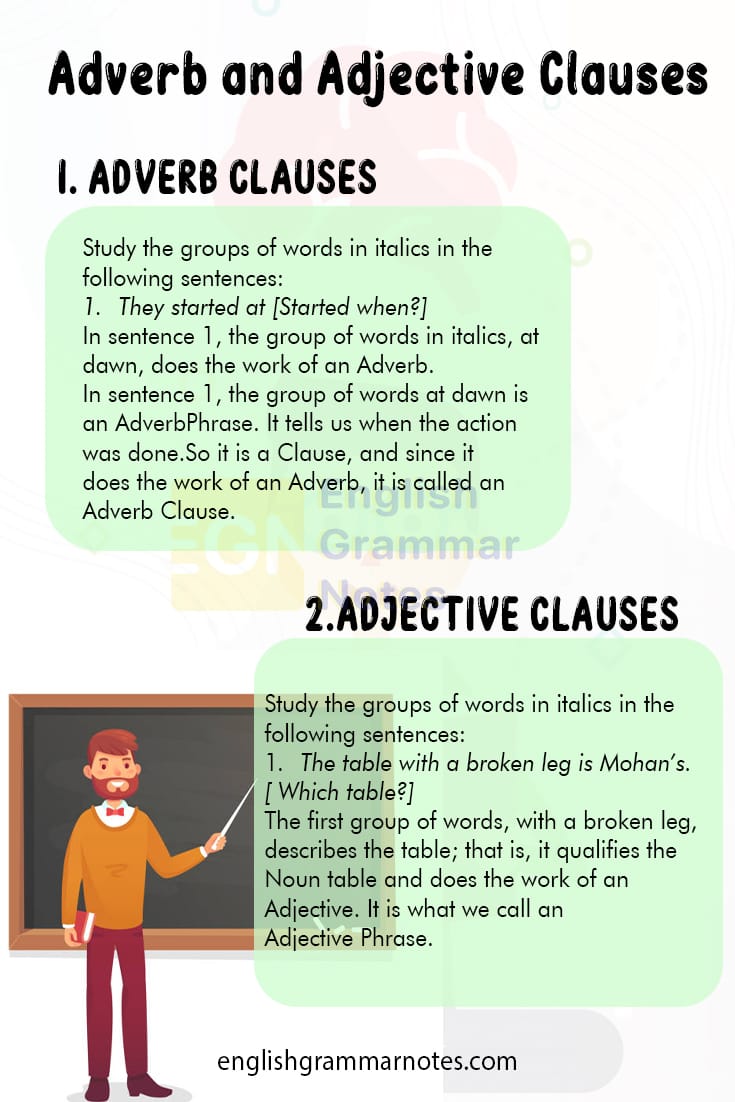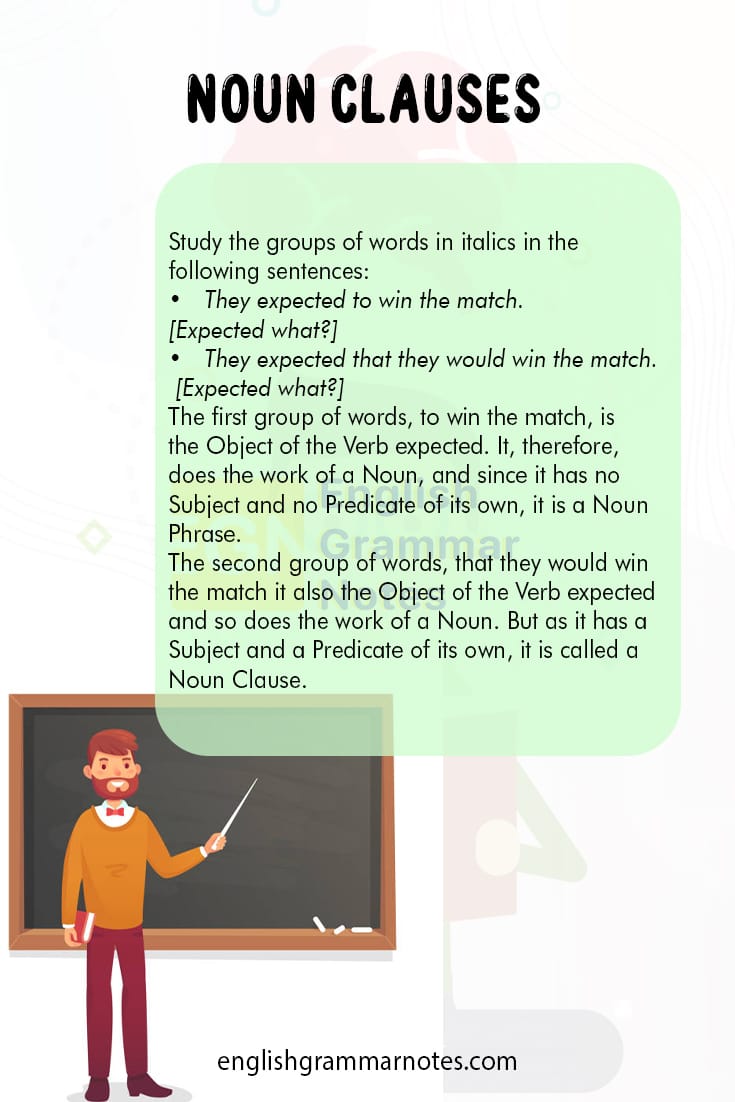Adverb, Adjective, Noun Clauses Examples and Exercises
I. ADVERB CLAUSES
Study the groups of words in italics in the following sentences:
- They started at [Started when?]
- They started when morning came. [Started when?]
In sentence 1, the group of words in italics, at dawn, does the work of an Adverb. It tells us when the action was done. In sentence 2, the group of words in italics, when morning came, also, modifies the Verb started and so does the work of an Adverb.
In sentence 1, the group of words at dawn is an Adverb Phrase. It tells us when the action was done. In sentence 2, the group of words in italics, when morning came, is not an Adverb Phrase. It has a Subject (morning) and a Predicate (came when). So it is a Clause, and since it does the work of an Adverb, it is called an Adverb Clause.
Study the following sentences:
- On her return to India, we asked her many questions.
- When she returned to India we asked her many questions.
We notice that the Adverb Phrase, on her return to India is equivalent in meaning to the Adverb Clause, when he returned to India, and can therefore be replaced by it.
Exercise 1: In the following sentences, replace the Adverb Phrases by Adverb Clauses.
- He always carried out his duties according to instructions.
- Her heart was too full for words.
- In spite of hard work we failed.
- He was welcomed on his return from the U.S.A.
- He ran with all his might.
- He did it to the best of his ability.
- Many people were so injured as to be wholly incurable.
- They fought in a heroic manner.
- They returned at sunset.
- In the event of the President’s death, the Vice-President succeeds him.
Exercise 2: In the following sentences replace the Adverb Clauses with Adverbs or Adverb Phrases.
- He considered himself rich enough though his income was only Rs 50,000 a year.
- He was not so rich that he could buy a motor car.
- The news is so good that it cannot be true.
- As soon as the thief saw the policeman, he ran away.
- Though he is poor, he is contented.
- He works hard that he may become rich.
- I am glad that he has recovered from his illness.
- No man can become rich unless he works hard.
- As he was ill, he did not attend the meeting.
- When she entered the room she saw the vase broken.
II. ADJECTIVE CLAUSES
Study the groups of words in italics in the following sentences:
- The table with a broken leg is Mohan’s. [ Which table?]
- The table which has a broken leg is Mohan’s. [Which table?]
The first group of words, with a broken leg, describes the table; that is, it qualifies the Noun table and does the work of an Adjective. It is what we call an Adjective Phrase.
The second group of words that has a broken leg also describes the table, and so does the work of an Adjective. But since it has a Subject and a Predicate of its own, it is an Adjective Clause.

Read the following Sentence:
- A man of courage is respected everywhere.
- A man who is courageous is respected everywhere.
Here the Adjective Phrase of courage is equivalent in meaning to the Adjective Clause, who is courageous and can therefore be replaced by it.
Exercise 3: In the following sentences replace the Adjective Phrases by suitable Adjective Clauses.
- We all admire a man of industrious habits.
- Please tell me the time of his departure.
- This accident took place on the road leading to the station.
- The houses of the Kashmiris are generally built of wood.
- That city on the hill has an old temple.
- A man of regular habits is sure to win the esteem of all.
- People occupying the last benches could not hear me.
- The boy sitting near you is my cousin.
- You can have anything of your liking.
- The time of his arrival will be notified later on.
Exercise 4: In the following sentences replace the adjective clauses by adjective or adjective phrases
- A man who has diligent habits is sure to succeed.
- We all admire a man who is courageous.
- Uneasy lies the head that wears a crown.
- A man who talks too much is seldom listened to.
- People who live in glass houses should not throw stones at others.
- The day when he departed is still remembered.
- The day when he must part is drawing near.
- Can you tell me the way that leads to the Taj?
- The day on which he was crowned is still observed as a holiday.
- The boy who is industrious will win the prize.
III. NOUN CLAUSES
Study the groups of words in italics in the following sentences:
- They expected to win the match. [Expected what?]
- They expected that they would win the match. [Expected what?]
The first group of words, to win the match, is the Object of the Verb expected. It, therefore, does the work of a Noun, and since it has no Subject and no Predicate of its own, it is a Noun Phrase.
The second group of words, that they would win the match it also the Object of the Verb expected and so does the work of a Noun. But as it has a Subject and a Predicate of its own, it is called a Noun Clause.

Examine the following sentences:
- He hopes to win the first prize.
- He hopes that he will win the first prize.
In these sentences, the Noun Phrase, to win the first prize, is equivalent in meaning to the Noun Clause, that he will win the first prize, and can therefore be replaced by it.
Exercise 5: In the following sentences replace the Noun Phrases by suitable Noun Clauses.
- The time of his coming is known to me.
- I heard of her failure.
- The reason of his sudden disappearance is not known.
- I know your great fondness for music.
- We hoped for your success.
- The captain foretold the coming of a violent storm.
- Who can doubt the truth of his statement?
- I believe him to be an honourable man.
- He expects to win a prize.
- I know your great regard for her.
Exercise 6: Substitute either a Noun or Noun Phrase for the Noun Clause in each of the following sentences:
-
- Nobody expected that he would die.
- The jury declared that he was guilty.
- He expects that he will win a prize.
- I believe that the man is trustworthy.
- I appreciate that you love your country.
- The doctor is hopeful that she will soon recover.
- His friends believed that he was innocent.
- That he should fail surprises me.
- I hope that I shall reach there in time.
- We expect that there will be an improvement in business.
We have now seen that there are three kinds of Clauses :
- The Adverb Clause which does the work of an
- The Adjective Clause which does the work of an
- The Noun Clause which does the work of a
Exercise 7: Pick out the Clauses in the following sentences, and say what kind each is.
- The shepherd found the sheep which has been lost.
- We expect that he will succeed.
- I know the place where he was born.
- A boy who does not play at all is a dull boy.
- Tell me what you have done. .
- You may go home when you have finished.
- The boy, who had red hair,.greeted me with a smiling face.
- When the function was over, we returned home.
- When she was at school, she won many prizes.
- Where there’s a will there’s a way.
- Can’t you tell me what she wants?
- I do not know where he was born.
- I have lost the pen which you gave me yesterday.
- We all admire a man who has courage.
- This is the place where he was killed.
- Nobody knows where he was killed.
- We know where we can find her.
- They told him the reason why he failed in his trial.
- We told her the reason why she failed in her attempt.
- I know the woman who did this.
- I know who did this.
- Why she did such a foolish thing, I cannot understand.
- I know the place where the climate is good.
- She lives where the climate is good
- Do you know where the climate is good?
Exercise 8: In each of the following sentences replace the words in italics by Clauses.
- I know the place of her birth.
- We met a girl with blue eyes.
- A man of courage succeeds everywhere.
- He told us the time of her departure.
- Do you know the road leading to the Taj?
- The girl sitting near her is her daughter.
- She expected to win a prize.
- I cannot understand the reason for her failure.
- At sunset we returned home.
- The time of her arrival nobody can tell.
- I know your great love for her.
- We can tell the purpose of her coming here.
- The sun having risen, they resumed their journey.
- The King ordered the traitor to be hanged.
- I do not believe her statement.